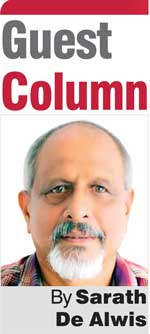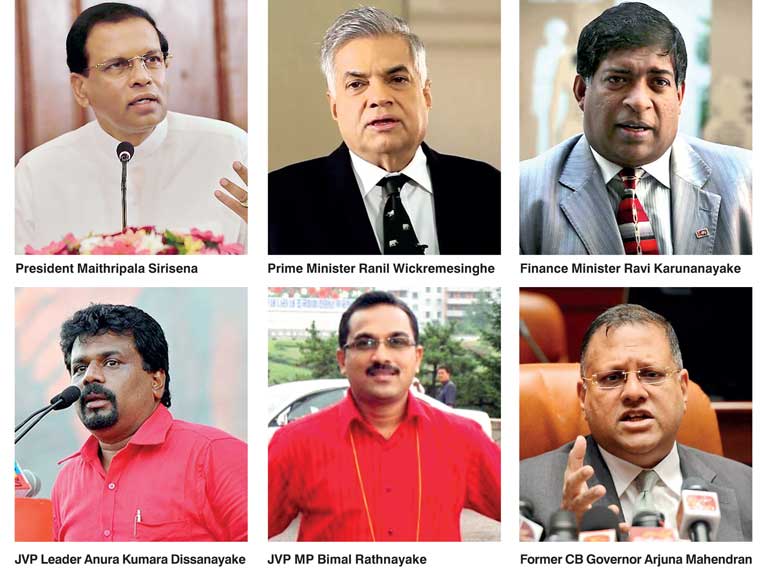The combination of the two titles of Irvin Shaw’s novel is depictive of the troubled but hopeful times we live in. The liberal-minded souls are gasping for breath in the Diyawanna swamp, grappling with facts and alternative facts. We too, have our supply of Trumpists.
The day after the much-awaited debate on the COPE report on Central Bank bonds, the Sinhala national daily Ada reported that the President has decisively rejected the proposal by the Minister of Finance to increase the price of lottery tickets. The President had told his ministers that the move by the Minister of Finance to increase it to Rs. 30 has provoked even those who were not critical of the Government. They too were now chastising the Government.
A senior journalist friend told this writer that the President’s response had been far more picturesque. Now only beggars spare us. With this, even they will not spare us. [‘Hinganno vitharai dan apata baninne neththe. Meken eegolloth patanganiy.’]
The day after the much-awaited debate on the COPE report on Central Bank bonds, the Sinhala national daily Ada reported that the President has decisively rejected the proposal by the Minister of Finance to increase the price of lottery tickets. The President had told his ministers that the move by the Minister of Finance to increase it to Rs. 30 has provoked even those who were not critical of the Government. They too were now chastising the Government.
A senior journalist friend told this writer that the President’s response had been far more picturesque. Now only beggars spare us. With this, even they will not spare us. [‘Hinganno vitharai dan apata baninne neththe. Meken eegolloth patanganiy.’]
 Decisive turning point
Decisive turning pointThe debate on the COPE report moved as an adjournment motion called for no vote. Yet it was a decisive turning point. The findings of the report together with its recommendations received the full endorsement of the Opposition and all SLFP members. The UNP members swallowed it with ill-concealed discomfort.
It served as a powerful spotlight on the nonchalance of an arrogant Prime Minister and the cynicism of a Finance Minister who resorts to nod and wink gerrymandering of figures. They must now read the writing on the wall. The largest-circulating Sinhala daily Lankadeepa reported the debate next day with a four-column banner headline ‘Punish the Bond Cheats’.
The debate saw a brilliant exercise of forensic accounting by two JVP Parliamentarians. JVP Leader Anura Kumara Dissanayake and Bimal Rathnayake conclusively demonstrated the orchestrated plunder that caused massive losses to the Employees’ Provident Fund. Despite puerile interruptions by UNP Parliamentarian Sujeewa Senasinghe, MP Bimal Rathnayake tabled the report of the Auditor General on all bond issues from 2008 to 2015. A scam is a con or trick. Commandeering an institution for one’s advantage is a hijack.
The debate did more than exposing a corrupt scam. It was a virtual hijacking of the national monetary authority by a Government-backed oligarchy that enabled primary dealer Perpetual Treasuries to make runaway profits to the tune of Rs. 13,000 million in the short span of 21 months.
It was a damning condemnation of a Prime Mister who at the early stages of the scandal adopted a haughty disdain that issues of sovereign bonds were too cerebral for the average Parliamentarian to comprehend. He was ably assisted in the futile attempt to deflect public opinion by a heedless Minister of Finance. His attempts to explain it as a rational ordinary transaction by intimidating the Auditor General to comply with his wink and nod accounting stood totally exposed.
 Elitist dinosaurs
Elitist dinosaurs In the aftermath of the debate on the COPE report on bonds, Prime Minister Ranil Wickremesinghe, Minister of Finance Ravi Karunanayake and Minister of Development Strategies Malik Samarawickrama have decided to raise the drawbridge and counter the siege by citing the risk of full public disclosure of sensitive information.
Both Prime Minster Ranil Wickremesinghe and Finance Minister Ravi Karunanayake are elitist dinosaurs lost in the chaotic democracy of post 8 January 2015.
The two Royal College alumni belong to that strange minority in this age of liberal populism who are stratified in the conviction that they are destined to rule. They are not constrained by legal, constitutional and ethical rules and practices. They are not shy of claiming an autonomy to interpret laws, modify them to suit their purpose and refashion public responsibility in a manner that protects their own interests.
There was a time before 8 January 2015 when the State deployed its formidable coercive machinery to intimidate mass media, influence public perceptions by payoffs to discontented groups. For 10 long years, they did manage to overcome threats to their vital interests.
The Chancellor of the Colombo University, Chief Incumbent of Bellanvilla Raja Maha Viharaya Bellanwilla Wimalarathne Thero, is an eminent Buddhist prelate of undoubted eminence. He fearlessly confronted President Sirisena on the issue of bonds.
Before proceeding any further, we must recall the days when his ability to call a spade a spade was not so pronounced. There have been plenty of past instances when the revered monk was ready to a call a spade by different names – a silver spoon or a gold ladle or whatever that Mahinda Rajapaksa desired.
It was another land and another time. The king has gone. This is the deluge after. The new topsy-turvy republic is a disorderly democracy. Nonetheless a vibrant democracy. Okay, if the revered monk thinks that homosexuality is unheard of in this chosen land, so be it. That is for another time.
President’s stance
Confronting the President, he asked if the proposed commission of inquiry was a veiled attempt of sweeping the scandal under a carpet of legal jigamajig. In response, the President was forthright. Discovery of the virtue of transparency is better late than never.
“It is I who removed Arjun Mahendran. It is I who appointed the internationally-renowned Indrajit Coomaraswamy as Governor,” responded the President. He unequivocally praised the Auditor General as an officer of unimpeachable integrity.
Where does that leave the Prime Minister and the Minister of Finance? They are both up the creek without a paddle. The President’s unreserved and much deserved praise of the Auditor General is a distinctly damning rebuke of the Minister of Finance.
The President has clearly embarked on a new trajectory. The choice of venue – Abhayaramaya – may have been coincidental, the provocative speech that spurred presidential outpouring could have been accidental. However what transpired then was a definite outflanking of two inconvenient protagonists – the former President who he dislodged and the current Prime Minister to whom he was a puppet dangling on the strings of promised good governance.
Thieves are thieves, whether they were from the earlier or current regime, he declared. Once the past two years are probed, I will deal with the earlier periods as well, he promised. In the last two years he was guided by the simple maxim, “Great is truth, but still greater, from a practical point of view, is silence about truth.” We hope that he will remain on track.
There is an old Latin saying ‘corvus oculum corvi non eruit’ – “a crow will not pull out the eye of another crow”. It is a substitute for “honour amongst thieves”. It explains the stoical solidarity amongst likeminded people who go about their business of subterfuge, regardless of consequences or condemnation of actions which they know to be wrong.
Both Nivard Cabraal and Arjun Mahendran are likeminded people. By enlisting Arjun Mahendran for Cabraal’s job, the UNP oligarchs thought that the bond business was a State-owned mechanism in perpetual motion for personal profit.
One year ago, in the columns of the Daily FT in February 2016, this writer described the predicament of the Prime Minister defending the indefensible.
It was captioned ‘Up the creek without a paddle’. My concluding lines one year ago has a predictive reverberation. I quote: “I recall a conversation I had with Dr. S.A Wickramasinghe when he differed from his colleague Pieter Keuneman on the Communist party remaining in the United Front Government in 1975. He said gravely, ‘It is not about pragmatic politics. It is a matter of class.’ Do Maithri and Ranil belong to the same class?”
Now we know. Or do we?

